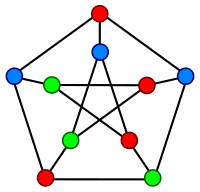
A parameterized approximation algorithm for the mixed and windy capacitated arc routing problem: Theory and experiments
Sign Up to like & getrecommendations! Published in 2017 at "Networks"
DOI: 10.1002/net.21742
Abstract: We prove that any polynomial-time $\alpha(n)$-approximation algorithm for the $n$-vertex metric asymmetric Traveling Salesperson Problem yields a polynomial-time $O(\alpha(C))$-approximation algorithm for the mixed and windy Capacitated Arc Routing Problem, where $C$ is the number of… read more here.
Keywords: approximation algorithm; approximation; polynomial time; problem ... See more keywords

Minimum-Cost b-Edge Dominating Sets on Trees
Sign Up to like & getrecommendations! Published in 2018 at "Algorithmica"
DOI: 10.1007/s00453-018-0448-z
Abstract: In this paper, we consider the minimum-cost b-edge dominating set problem. This is a generalization of the edge dominating set problem, but the computational complexity for trees is an astonishing open problem. We make steps… read more here.
Keywords: minimum cost; polynomial time; cost edge; edge dominating ... See more keywords

Optimizing a Generalized Gini Index in Stable Marriage Problems: NP-Hardness, Approximation and a Polynomial Time Special Case
Sign Up to like & getrecommendations! Published in 2019 at "Algorithmica"
DOI: 10.1007/s00453-019-00550-3
Abstract: This paper deals with fairness in stable marriage problems. The idea studied here is to achieve fairness thanks to a Generalized Gini Index (GGI), a well-known criterion in inequality measurement, that includes both the egalitarian… read more here.
Keywords: polynomial time; marriage problems; stable marriage; case ... See more keywords

Operator Scaling: Theory and Applications
Sign Up to like & getrecommendations! Published in 2020 at "Foundations of Computational Mathematics"
DOI: 10.1007/s10208-019-09417-z
Abstract: In this paper, we present a deterministic polynomial time algorithm for testing whether a symbolic matrix in non-commuting variables over $${\mathbb {Q}}$$ Q is invertible or not. The analogous question for commuting variables is the… read more here.
Keywords: theory; polynomial time; commuting variables; analysis ... See more keywords

Structures Computable in Polynomial Time. I
Sign Up to like & getrecommendations! Published in 2017 at "Algebra and Logic"
DOI: 10.1007/s10469-017-9416-y
Abstract: It is proved that every computable locally finite structure with finitely many functions has a presentation computable in polynomial time. Furthermore, a structure computable in polynomial time is polynomially categorical iff it is finite. If… read more here.
Keywords: computable polynomial; structures computable; polynomial time; structure ... See more keywords

Polynomial-time approximation algorithms for the coloring problem in some cases
Sign Up to like & getrecommendations! Published in 2017 at "Journal of Combinatorial Optimization"
DOI: 10.1007/s10878-016-0008-x
Abstract: We consider the coloring problem for hereditary graph classes, i.e. classes of simple unlabeled graphs closed under deletion of vertices. For the family of the hereditary classes of graphs defined by forbidden induced subgraphs with… read more here.
Keywords: coloring problem; time approximation; polynomial time; problem ... See more keywords

Constructing composition factors for a linear group in polynomial time
Sign Up to like & getrecommendations! Published in 2020 at "Journal of Algebra"
DOI: 10.1016/j.jalgebra.2020.02.018
Abstract: Abstract We present a Las Vegas polynomial-time algorithm that takes as input a subgroup of GL ( d , F q ) and, subject to the existence of certain oracles, determines its composition factors, provided… read more here.
Keywords: polynomial time; composition factors; factors linear; constructing composition ... See more keywords

Using Approximation Algorithms to Build Evidence Factors and Related Designs for Observational Studies
Sign Up to like & getrecommendations! Published in 2019 at "Journal of Computational and Graphical Statistics"
DOI: 10.1080/10618600.2019.1584900
Abstract: Abstract Observational or nonrandomized studies of treatment effects are often constructed with the aid of polynomial-time algorithms that optimally form matched treatment-control pairs or matched sets. Because each observational comparison may potentially be affected by… read more here.
Keywords: polynomial time; evidence factors; comparison; approximation ... See more keywords

Polynomial-Time Reachability for LTI Systems With Two-Level Lattice Neural Network Controllers
Sign Up to like & getrecommendations! Published in 2022 at "IEEE Control Systems Letters"
DOI: 10.1109/lcsys.2022.3231556
Abstract: In this letter, we consider the computational complexity of bounding the reachable set of a Linear Time-Invariant (LTI) system controlled by a Rectified Linear Unit (ReLU) Two-Level Lattice (TLL) Neural Network (NN) controller. In particular,… read more here.
Keywords: network; time; reachability; polynomial time ... See more keywords

Polynomial-Time Verification and Enforcement of Delayed Strong Detectability for Discrete-Event Systems
Sign Up to like & getrecommendations! Published in 2023 at "IEEE Transactions on Automatic Control"
DOI: 10.1109/tac.2021.3140111
Abstract: Detectability is a fundamental property in partially observed dynamical systems. It describes whether one can use observed output sequences to determine the current and subsequent states. Delayed detectability generalizes detectability in the sense that when… read more here.
Keywords: time; polynomial time; strong detectability; detectability ... See more keywords

Reliable Co-Prognosability of Decentralized Stochastic Discrete-Event Systems and a Polynomial-Time Verification.
Sign Up to like & getrecommendations! Published in 2021 at "IEEE transactions on cybernetics"
DOI: 10.1109/tcyb.2021.3051260
Abstract: Fault prognosis of discrete-event systems (DESs) aims to predict the occurrence of fault beforehand such that certain protective measures may be adopted before the fault occurs. This article investigates the reliable coprognosability issue for decentralized… read more here.
Keywords: decentralized stochastic; discrete event; reliable coprognosability; event systems ... See more keywords